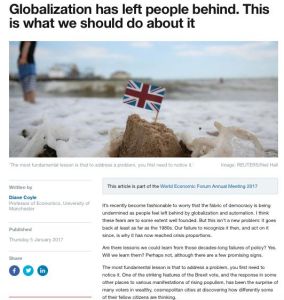Únase a getAbstract para acceder al resumen.

Únase a getAbstract para acceder al resumen.
Diane Coyle
Globalization has left people behind. This is what we should do about it.
World Economic Forum, 2017
¿De qué se trata?
Now is the time to acknowledge globalization’s losers.
Recommendation
Brexit and the rapid rise of populism in Western societies are symptoms of a problem decades in the making: Globalization has left many people worse off. Diane Coyle, an economics professor at the University of Manchester, sees the current political crisis as a window of opportunity for policy change. Failure to address the economic discrepancies that globalization causes, she warns, can have disastrous political consequences. Her suggestions remain superficial, but – while always politically neutral – getAbstract recommends her timely wake-up call to policy makers and concerned citizens.
Summary
About the Author
Diane Coyle is a professor of economics at the University of Manchester and founder of Enlightenment Economics, a consultancy specializing in economic issues related to new technologies, innovation and competition policy.























Comment on this summary